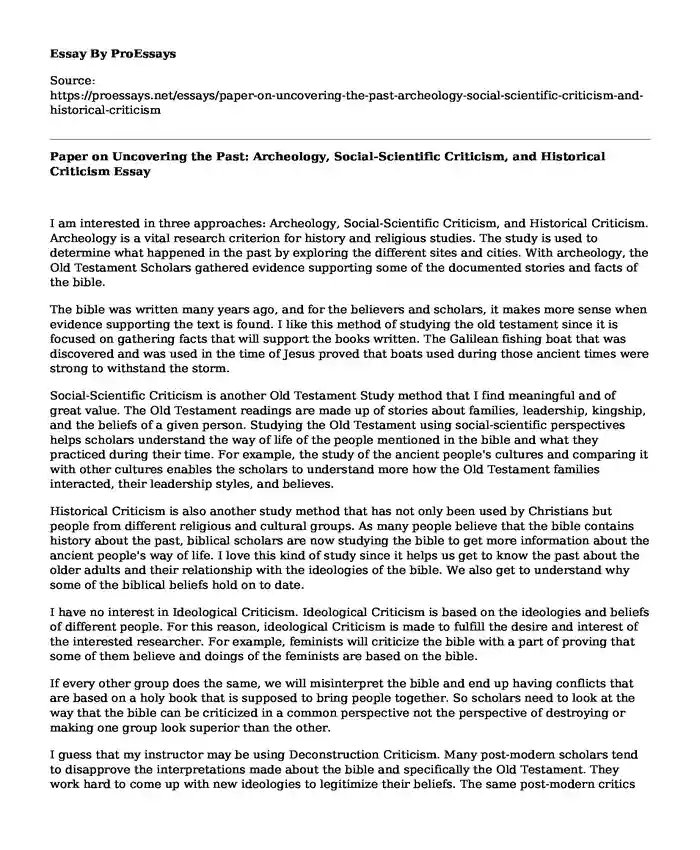I am interested in three approaches: Archeology, Social-Scientific Criticism, and Historical Criticism. Archeology is a vital research criterion for history and religious studies. The study is used to determine what happened in the past by exploring the different sites and cities. With archeology, the Old Testament Scholars gathered evidence supporting some of the documented stories and facts of the bible.
The bible was written many years ago, and for the believers and scholars, it makes more sense when evidence supporting the text is found. I like this method of studying the old testament since it is focused on gathering facts that will support the books written. The Galilean fishing boat that was discovered and was used in the time of Jesus proved that boats used during those ancient times were strong to withstand the storm.
Social-Scientific Criticism is another Old Testament Study method that I find meaningful and of great value. The Old Testament readings are made up of stories about families, leadership, kingship, and the beliefs of a given person. Studying the Old Testament using social-scientific perspectives helps scholars understand the way of life of the people mentioned in the bible and what they practiced during their time. For example, the study of the ancient people's cultures and comparing it with other cultures enables the scholars to understand more how the Old Testament families interacted, their leadership styles, and believes.
Historical Criticism is also another study method that has not only been used by Christians but people from different religious and cultural groups. As many people believe that the bible contains history about the past, biblical scholars are now studying the bible to get more information about the ancient people's way of life. I love this kind of study since it helps us get to know the past about the older adults and their relationship with the ideologies of the bible. We also get to understand why some of the biblical beliefs hold on to date.
I have no interest in Ideological Criticism. Ideological Criticism is based on the ideologies and beliefs of different people. For this reason, ideological Criticism is made to fulfill the desire and interest of the interested researcher. For example, feminists will criticize the bible with a part of proving that some of them believe and doings of the feminists are based on the bible.
If every other group does the same, we will misinterpret the bible and end up having conflicts that are based on a holy book that is supposed to bring people together. So scholars need to look at the way that the bible can be criticized in a common perspective not the perspective of destroying or making one group look superior than the other.
I guess that my instructor may be using Deconstruction Criticism. Many post-modern scholars tend to disapprove the interpretations made about the bible and specifically the Old Testament. They work hard to come up with new ideologies to legitimize their beliefs. The same post-modern critics have read all the religious texts and always try to connect the available religious texts. Being a post-modern scholar, my instructor must be keen on deconstruction criticism since all along, he has had a different perspective on the existing interpretation of the biblical texts.
Cite this page
Paper on Uncovering the Past: Archeology, Social-Scientific Criticism, and Historical Criticism. (2023, Nov 22). Retrieved from https://proessays.net/essays/paper-on-uncovering-the-past-archeology-social-scientific-criticism-and-historical-criticism
If you are the original author of this essay and no longer wish to have it published on the ProEssays website, please click below to request its removal:
- Fractional Distillation Report Example
- Norman Foster and Inspirational Architect Paper Example
- Literary Analysis Essay on People of Earth: An Introduction to World Pre-History
- Safe Medical Devices Act of 1990: A Milestone in US History - Essay Sample
- Traits of Frederick Douglass' Leadership Essay
- Mid-20th Century US: Changes in Culture, Economy, Population - Essay Sample
- Cold War: US and USSR Post-WWII Global Politics - Essay Sample







